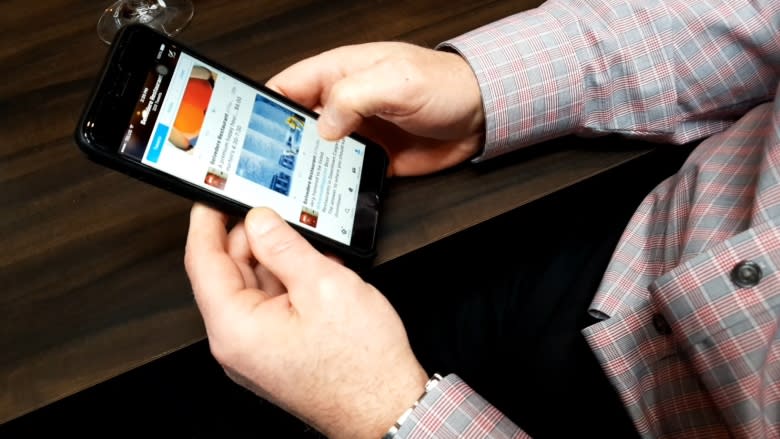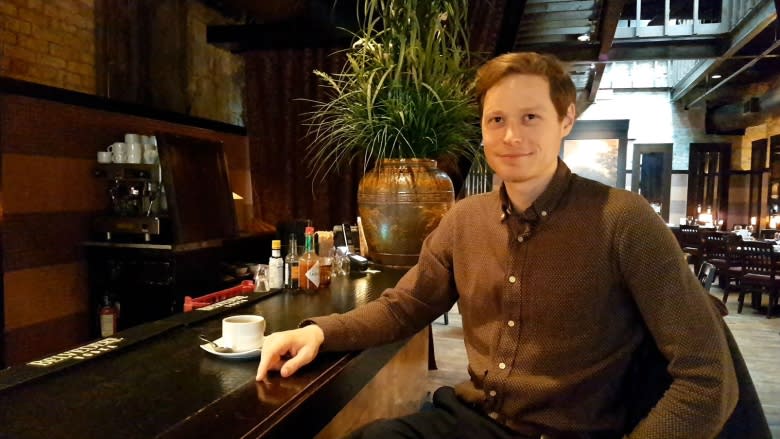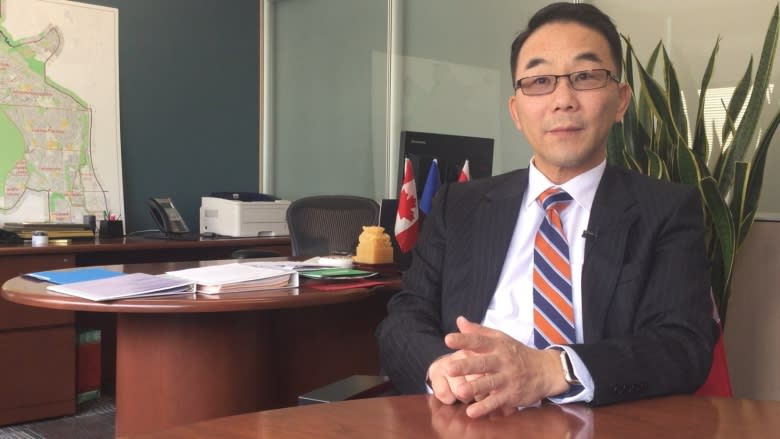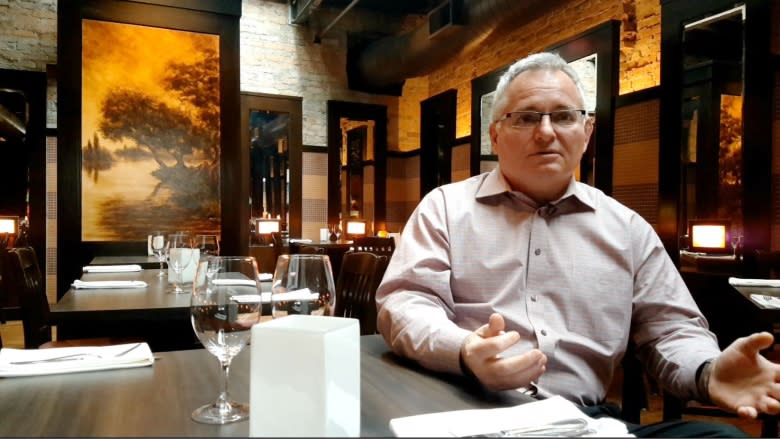How to turn social media spats into civil conversation: take them offline
Clayton Morgan and Darren Mazzei have more in common than they realized from each other's Twitter avatars.
One is a Calgary restaurant owner. The other, a cycling advocate. They disagree about bike lanes but both love fine food and good conversation — a discovery they only made by taking a heated social media discussion offline.
They agreed to meet in person after a days-long Twitter battle between the restaurateur and the city's cycling community over the value of Calgary's separated bike lanes.
"We talked like two civil individuals," Morgan said of the in-person meeting.
"He is not my enemy. I am not his enemy. We have different views. So be it."
Mazzei, who initiated the conversation, said it was a little awkward at first but the pair quickly broke the ice with a little small talk before getting into the meat of their disagreement.
"I found it pretty interesting and very civil compared to what the social media side of it was," he said.
Their experience seems to be rare these days, according to social media experts who say our busy lives and reliance on digital devices has crowded out the nuance and understanding we took for granted when slower-paced, in-person interactions were the norm, rather than the exception.
It's far easier when talking online to spit venom and cause harm to others without realizing the impact of our words, according to Bruce Cameron, president of Social Media ROI, a consulting and research firm that specializes in digital communication.
"The interesting thing about social media ... is that it has actually spawned, in some cases, very anti-social behaviour," he said.
Is social media making us anti-social? That was the topic on Alberta@Noon. Catch a rebroadcast of the call-in show here:
Even when no offence is intended, Cameron said the quick-hit, asynchronous nature of online messaging makes it easy to perceive slights and respond in a way that escalates the conversation.
"There's a lot of cues that people take in person that are just absent when they're doing it online," he said.
"When people are face-to-face, they tend to be able to soften what they're saying or you can at least see that they may be smiling when they say something."
'It was pretty aggressive'
Mazzei said he wanted to reach out to Morgan because he felt the passionate response from the bike community — a relatively small number of people in the city who are often the ones on the receiving end of online abuse — had gone overboard and was inadvertently doing more harm than good for the group's cause.
"Bike people were jumping on him and I thought it was pretty aggressive," Mazzei said.
"I wanted to hear his perspective on it and see if we could come to some common ground."
Mazzei figures the situation was amplified because Morgan was tweeting from his company's account and many of his opponents figured they were arguing with a restaurant, forgetting there was a real person behind it.
Morgan, who had become quite frustrated by the response he received online, said talking with Mazzei in real life was a breath of fresh air.
"Talking to a person face-to-face, I think you get a better feel for the individual," he said. "You don't jump to conclusions based on 140 characters."
He also defended his use of the Belvedere's Twitter account to discuss public policy.
"If the policy affects the business, why should I not express those views?"
Walking a fine line
It's especially tough for small businesses to navigate the rapidly changing world of digital communication, said Kelly Doody, co-founder of The Social School, a Calgary-based group that helps entrepreneurs with that challenge.
"Businesses are expected to be on social media. It's just a given," she said.
"If they're not responsive and they're not engaging with the general public, let alone their clients and customers, then it's almost like a slight on them."
And when it comes to political topics, business owners have to walk an especially fine line.
Doody said many customers want businesses to butt out of politics, while others expect them to take a stand and let it be known where they fall on a particular issue — and a single misstep can lead to a mob mentality taking over and skewering the offending company.
"When I watch it, it breaks my heart because, in a lot of cases, there's livelihoods on the line, there's jobs on the line."
Pick up the phone
Sean Chu is familiar with social media missteps.
The Calgary city councillor has apologized on numerousoccasions for things he's said in the heat of the moment, things that often brought the wrath of the Twitter mobs down upon him.
He's also made a point of stepping outside the digital space because he finds people much more understanding in person than online.
A favourite story of his relates to a tweet he sent about "global warming alarmists" falling silent during a particularly cold snap one Calgary winter that prompted a flood of critics noting his conflation of climate and weather.
He said one irate constituent wrote him a two-page email in response, vowing to do her best to vote him out of office in the next election.
"I called this person back 13 times — left a message 12 times and on the 13th time I got a hold of this person. The first thing she said was thank you for never giving up. After that we had a 20-minute conversation," Chu said.
"We agreed to disagree, but that's what happens when you actually put the human touch behind any kind of conversation, be that face to face or over the phone."
The next generation of apps — and people
In his work with Social Media ROI, Cameron said he's started to see a backlash against certain platforms because of the anxiety they can provoke.
"Some people are, for their own mental health, choosing to unplug," he said.
"And the large companies behind Twitter, Facebook and other forms of social media — other platforms — are really, really considering how to deal with that."
There's been a shift toward more visual, less confrontational platforms like Instagram and Pinterest, Cameron said, as well as toward more immediate and more private apps like Snapchat.
Morgan, though, wonders if it's too late for some people.
He worries about children growing up with their heads buried in digital devices to the point that many seem to have trouble making eye contact during conversation.
"Kids nowadays, they're so shy," he said. "But they can text. They can tweet."
Even among adults, he feels talking face-to-face is a lost art and one he laments losing. He feels online discussions tend to polarize people into like-minded silos where differences of opinion are rare and reviled.
In real life, he enjoys frank but friendly chats with people like Mazzei — especially when they disagree.
"I can't imagine a world where everybody thought alike," he said. "What a boring place that would be."






